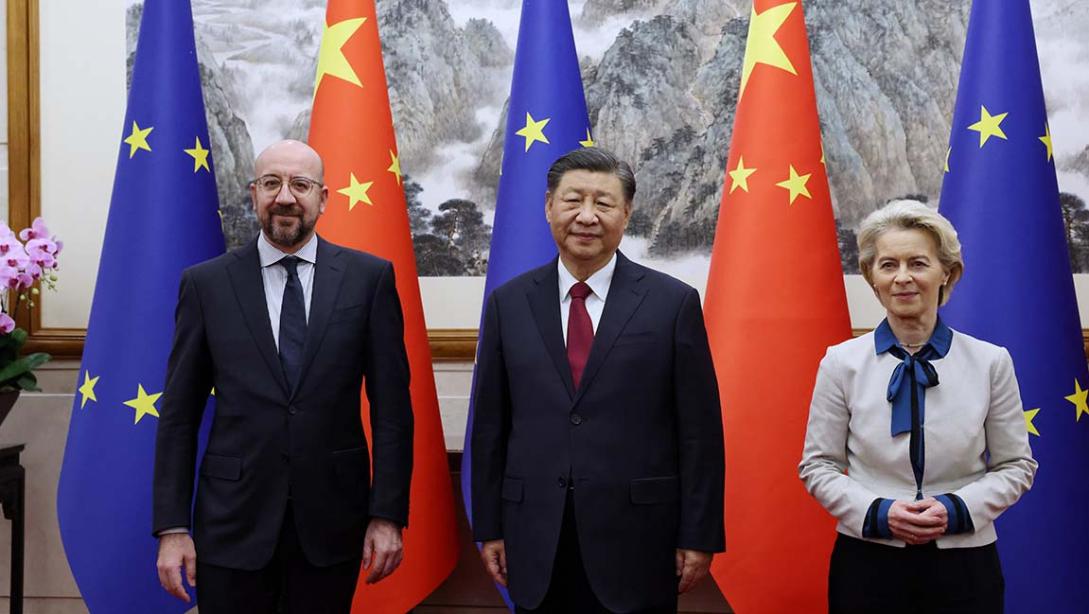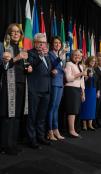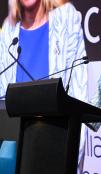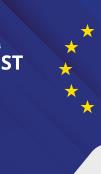24th EU-China Summit

Regarded by the EU an opportunity to engage with Beijing both European Union leaders underlined that the relationship between the EU and China is multifaceted and relies on both partners working with each other to achieve success.
'Our relationship with China is complex and we have a responsibility to make it work,' said President of the European Commission Ursula von der Leyen.
President von der Leyen also noted that both sides agreed that it was in their joint interest to have balanced trade relations.
‘And we need to address challenges in a world with increasing geopolitical frictions,’ she said.
The EU leaders reiterated it was a priority for both parties that the world operate under a well-functioning, rules-based international order, with the United Nations at its heart.
But they noted that China as a permanent member of the UN Security Council, had a responsibility to uphold the UN Charter’s core principles, including territorial integrity and sovereignty.
Calling on China to use its role to protect the UN charter and notably the sovereignty and territorial integrity of all countries, the President of the European Council Charles Michel said that the EU would ‘continue to engage with China based on transparency, predictability, and reciprocity.’
China Should Play a Positive Influence on Russia
The EU also reminded Beijing that it was able to use its influence on Russia to stop its war of aggression in the Ukraine with the EU encouraging China to engage on Ukraine’s Peace Formula while continuing to refrain from supplying lethal weapons to Moscow and preventing any attempts by Russia to circumvent or undermine the impact of sanctions.
While the EU reaffirmed its consistent One China policy the EU leaders also expressed their concerns about increased tensions in the Taiwan Strait, pointing out that heightened instability in the East and South China Seas threatens regional and global prosperity and security.
They also explained that the EU would opposed any unilateral attempts to change the status quo by force or coercion. Disputes, they argued, must be resolved through peaceful means in accordance with international law, such as the United Nations Convention on the Law of the Sea (UNCLOS). Leaders further discussed the situation on the Korean Peninsula, in Afghanistan, Myanmar, and Iran.
Middle East Conflict Must Stay Within International Law
While condemning in the strongest terms the indiscriminate and brutal terrorist attacks by Hamas against Israel. The EU also reiterated that Israel’s right to defend itself must stay in line with international humanitarian law, with both sides agreeing on the importance of ensuring the safety of civilians, improving the dire humanitarian situation in Gaza and implementing UN Security Council Resolution 2712.
The EU and China also restated their commitment to finding a two-state solution to the Israeli-Palestine issue.
EU Concerned About Human Rights in China
In the discussions the EU leaders also shared their deep concerns about the human rights situation in China, notably systemic human rights violations in Xinjiang and Tibet, forced labour, the treatment of human rights defenders and persons belonging to minorities, as well as the continued erosion of fundamental freedoms in Hong Kong, where China should uphold its previous commitments.
In the meantime, the EU welcomed the resumption of the Human Rights Dialogue in February 2023 and underlined its expectation for the next dialogue to take place in 2024 in China.
De-risking not Decoupling on Trade
In regards to trade the EU noted that the trade relationship is critically and structurally imbalanced between the two partners. While the EU does not intend to decouple or to turn inwards, it does have serious concerns about the underlying distortions and the negative effects of manufacturing overcapacity in China's economy.
The EU stressed to China the importance of achieving a more balanced economic relationship with a level playing field and reciprocity. It was also underlined that there was a need for progress in addressing the core EU interests and longstanding demands (e.g., transparency in the business environment, predictable supply chains, trade distortions including industrial subsidies, and sector-specific trade barriers).
The EU stressed the two sides' joint responsibility to ensure a transparent and competitive environment for the digital economy, including a level playing field for artificial intelligence that respects human rights and fundamental freedoms. The EU underscored the common goal of avoiding fragmentation of standards for information and communication technologies.
The EU leaders expressed its expectation that China takes concrete steps to improve market access and the investment environment for EU investors and exporters. The EU recalled that de-risking but not decoupling aims at strengthening resilience by addressing critical dependencies in specific sectors, in full compliance with the World Trade Organisation rules.
Climate Change Action Critical Responsibility of All Countries
Finally, the leaders welcomed continued cooperation on climate change and the environment, as exemplified by recent agreement to work further on emissions trading and circular economy.
As major economies, the EU and China must lead global efforts to reduce greenhouse gas emissions including at the ongoing COP28. The EU acknowledged recent progress on expansion of renewable energy and China’s intention to tackle methane emissions.
The EU underlined the urgent responsibility for all states to step up climate ambition and called on China, to join the Global pledge to triple renewable energy capacity and double the rate of energy efficiency improvements by 2030, as well as the Global Methane Pledge.
Further reading:
- 24th EU-China Summit: engaging to promote our values and defend our interests
- EU-China Summit - Of Rivalry and Partnership - HR/VP Blog
- Statement by President von der Leyen at the joint press conference with President Michel following the EU-China Summit
- Remarks by President Charles Michel at the press conference following the EU-China summit in Beijing
- Remarks by President Charles Michel during his meeting with President of the People's Republic of China Xi Jinping
- EU-China Summit in Beijing - Videos of the Summit
- EU-China Relations Factsheet





